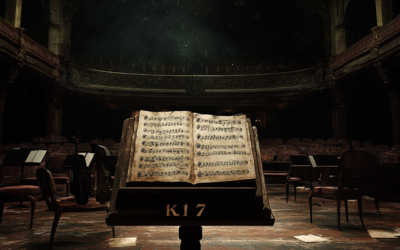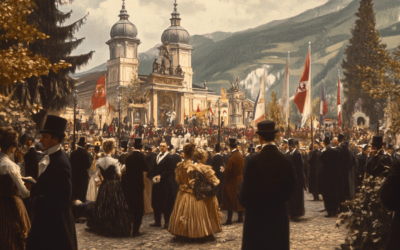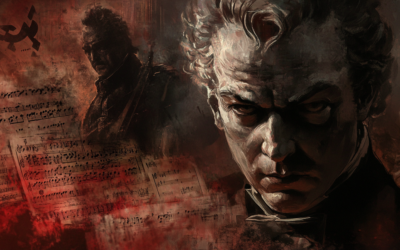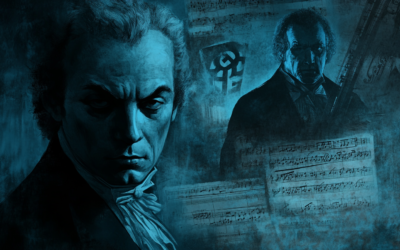The Unveiling of Symphony K.16
A Mozart Myth Dismantled
The Symphony No. 1 in E-flat major, K.16, attributed to young Wolfgang Mozart, reveals the complex truth behind his early compositions. Far from the prodigious work of an eight-year-old, it is instead a product of substantial parental intervention and musical simplification.
Mozart: The Fall of the Gods
This book offers a fresh and critical look at the life of Wolfgang Amadeus Mozart, challenging the myths that have surrounded him for centuries. We strip away the romanticised image of the “natural genius” and delve into the contradictions within Mozart’s extensive biographies. Backed by nearly 2,000 meticulously sourced citations, this work invites readers to explore a deeper, more complex understanding of Mozart. Perfect for those who wish to question the traditional narrative, this biography is a must-read for serious music lovers and historians.
“The original, more sophisticated musical passages were simplified by Leopold, possibly to align with the expectations of an infant prodigy.”
Mozart: The Fall of the Gods
Mozart’s Symphony No. 1 in E-flat major, K.16, long celebrated as a testament to his prodigious talent at just eight years old, reveals a much less straightforward reality. This symphony, attributed to the young Wolfgang Amadeus Mozart, is often paraded as evidence of his exceptional abilities. However, a closer examination suggests a more complex and less flattering picture.
The K.16 manuscript, bearing the title written by Mozart’s father Leopold, was intended to showcase Wolfgang’s early compositional prowess. Yet, historical accounts, including those from Mozart’s sister Nannerl, hint at significant doubts about the authenticity of this narrative. Nannerl’s memoirs recount a period in London when Wolfgang was supposedly barred from the piano due to Leopold’s illness, leading to the composition of this symphony. However, the evidence points to Leopold’s extensive involvement in both the composition and the final version of the piece.
The manuscript reveals several inconsistencies and peculiarities. For instance, while Nannerl claimed the symphony was intended to feature prominent parts for trumpets and timpani, these elements are notably absent in the K.16. Furthermore, the music’s complexity seems incongruous with the supposed abilities of an eight-year-old. The original, more sophisticated musical passages were simplified by Leopold, possibly to align with the expectations of an infant prodigy.
Leopold’s influence is evident in the extensive corrections and alterations found in the manuscript. Rather than a product of youthful genius, K.16 appears to be a heavily edited work, with Leopold’s modifications aimed at making the music more suitable for a young child’s capabilities. This includes removing intricate imitations and simplifying harmonies to ensure they fit the narrative of Wolfgang’s prodigiousness.
Moreover, Mozart’s ability to compose intricate music without a keyboard—suggested by Nannerl’s accounts—seems questionable. Adult Mozart himself struggled with composition when not in proximity to a keyboard, raising further doubts about the symphony’s origins.
The true nature of K.16 reflects a collaborative effort, with Leopold playing a significant role in shaping the symphony to fit his son’s alleged talent. The work is less a demonstration of an eight-year-old’s genius and more a product of parental intervention and musical simplification.
You May Also Like
Constanze Mozart’s Enduring Love
Although some have doubted her devotion, Constanze’s own words and actions illustrate a widow deeply committed to preserving Mozart’s legacy. Diaries, personal correspondence, and eyewitness testimony all challenge the notion that she neglected his memory—while the circumstances around his burial grow ever more perplexing.
A Revealing New Interview on His Thematic Catalogue
We’re excited to present a brand-new interview that challenges many of the long-held assumptions about Mozart’s Thematic Catalogue (1784–1791). Conducted by Swedish journalist Henry Grynnsten, this conversation delves into groundbreaking forensic techniques—like advanced ink analysis and digital image processing—that may change the way we view Mozart’s late works.
The Rattling Symphony: A Critical Take on K. 17
Often attributed to Mozart, the K. 17 symphony is anything but refined. Lacking orchestration and filled with gaps, it raises more questions than answers about its true authorship.
The Hidden Origins of the Salzburg Festival: A Nationalist Dream
The Salzburg Festival, far from being a mere celebration of Mozart’s genius, was born out of nationalist ambitions during a turbulent period in Austro-German history. Conceived by figures like Max Reinhardt, Heinrich Damisch, and Friedrich Gehmacher, the festival was deeply rooted in ultranationalistic ideals, transforming Mozart’s legacy into a tool for cultural dominance. The truth behind its founding has long been obscured, but the primary sources tell a different, darker story.
Mozart, Wagner, and the Nazi Myth
The Führer’s admiration for Wagner’s racially charged ideology not only influenced the policies of the Nazi regime but also reshaped the legacy of Mozart. Under National Socialism, Mozart was not celebrated as a universal genius but as a symbol of German purity and superiority. His music, stripped of its international influence, was rebranded as an expression of Aryan identity, intended to unify and inspire the German people.
Mozart, the Anschluss, and Nazi Propaganda
Following the 1938 Anschluss, the Nazi regime rebranded Mozart as the quintessential German composer, using his image to promote unity between Austria and Germany. The Salzburg Festival became a platform for Nazi propaganda, distorting Mozart’s legacy to fit their nationalistic and racial agenda.







